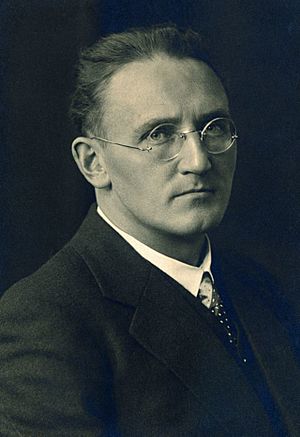Hermann Scherchen facts for kids
Hermann Scherchen (born June 21, 1891 – died June 12, 1966) was a famous German conductor. He was known for leading orchestras and helping new music become popular.
Life and Music
Hermann Scherchen was born in Berlin, Germany. When he was a teenager, he played the viola in the Bluthner Orchestra in Berlin. He started conducting orchestras in different cities. From 1914 to 1916, he conducted in Riga. Later, from 1928 to 1933, he worked in Königsberg.
When the Nazi regime came to power in Germany, Scherchen disagreed with their ideas. He left Germany in protest and moved to Switzerland. There, he played a big part in the music scene of Winterthur. He helped introduce many new musical pieces, especially modern music. For many years, from 1922 to 1950, he was the main conductor of the city orchestra in Winterthur.
Scherchen was a big supporter of 20th-century composers. He performed works by famous musicians like Arnold Schoenberg, Richard Strauss, and Anton Webern. He also helped younger composers like Iannis Xenakis and Luigi Nono get their music heard.
He was also a teacher to many students who became conductors themselves, including Karel Ančerl and Karl Amadeus Hartmann. Scherchen even helped write parts of Hartmann's opera Simplicius Simplicissimus.
One of his most famous works is his orchestral version of Bach's The Art of Fugue. He also wrote a very important book about conducting called "Lehrbuch des Dirigierens" in 1953. It's still used as a textbook today.
Scherchen had a unique way of conducting. Like some other conductors, he often did not use a baton. He would use small hand movements and talk to the musicians to guide them. Sometimes, this made it tricky for the players to follow him! However, he did use a baton sometimes, like when he rehearsed Bach's The Art of Fugue for a film.
Family Connections
Hermann Scherchen had several wives and many children. His first wife was Auguste Marie Jansen. They married in 1921. After a short marriage to actress Gerda Müller, he was with Auguste Marie again.
In 1936, Scherchen married Chinese composer Xiao Shuxian in Beijing. They had a daughter named Tona Scherchen, who also became a composer. His last wife was Pia Andronescu, a mathematics teacher from Zurich. They had five children together: Myriam, David, Esther, Nathan, and Alexandra.
He passed away in Florence, Italy, leaving behind many children.
One of his sons, Karl Hermann "Wulff" Scherchen, met the famous composer Benjamin Britten. Wulff's connection to Britten is mentioned in a song cycle by Lyle Chan.
His daughter, Myriam Scherchen, used to run a music company called Tahra. This company released old recordings of famous conductors, including her father.
Hermann Scherchen also helped his friend Alexander Radó, a cartographer. When Radó was in danger in Switzerland, Scherchen hid him in his apartment.
Famous Quote
- "Music does not have to be understood. It has to be listened to." (In German: "Musik muss nicht verstanden werden. Sie muss gehört werden.")
Recordings
Hermann Scherchen recorded a huge variety of music, from very old baroque pieces to modern ones. His recordings of Mahler's music were very important because Mahler's works were not as well-known back then. His recordings of Bach and Handel also helped change how people performed that music.
He also made important recordings of music by Haydn, Beethoven, Berlioz, and many others.
Some of his notable recordings include:
- In 1959, he recorded Handel's Messiah with singers like Pierrette Alarie and Nan Merriman.
- Also in 1959, he recorded Bach's Mass in B minor with a similar group of singers.
- In 1960, he recorded works by Max Reger with the Nordwestdeutsche Philharmonie orchestra.
Just five days before he died, Scherchen conducted a live performance of Malipiero's opera L'Orfeide in Florence. This performance was later released as a recording.
See also
 In Spanish: Hermann Scherchen para niños
In Spanish: Hermann Scherchen para niños
 | Selma Burke |
 | Pauline Powell Burns |
 | Frederick J. Brown |
 | Robert Blackburn |


